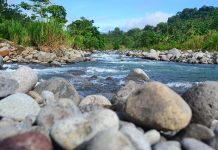
Three persons have died while 32 others were confined in government hospitals allegedly due to food poisoning after eating cooked sea turtle meat in Maguindanao del Norte province, a physician said.
Dr. Arrif Baguindali, chief of the Maguindanao Integrated Provincial Health Office, said the victims of the alleged food poisoning were brought to the Cotabato Regional and Medical Center (CRMC) for observation and treatment.
As of December 1, 31 individuals had been discharged while one is still being treated, he added.
Baguindali said the victims are from Barangay Linao, Datu Blah Sinsuat in Maguindanao del Norte, who reportedly consumed the meat of a captured sea turtle last November 25.
A few hours after eating the sea turtle meat, they suffered gastrointestinal symptoms, including diarrhea, dizziness, nausea, and vomiting, and were rushed to the nearby Lebak District Hospital in Sultan Kudarat province.
The incident was reported to the Epidemiological Bureau and in consultation with experts from the Philippine General Hospital (PGH) Toxicology Department, it was advised that all those who consumed the sea turtle meat, symptomatic or not, be admitted to the CRMC for observation and management, he said.
“Some believed that eating pawikan (sea turtle) can heal diseases as told by their ancestors. I hope they will stop believing that wrong belief,” said Dhoe Embe, a local resident.
While the idea of sea turtle meat as a delicacy might persist in some cultures, it carries significant health risks and legal consequences.
“Despite global efforts and international laws aimed at protecting endangered and threatened sea turtle populations, their consumption continues to be a long-standing tradition among many cultures around the world,” said Alonso Aguirre, dean of Colorado State University’s Warner College of Natural Resources.
His study, conducted in Sinaloa, Mexico, suggests that people who consume sea turtles have a greater risk of accumulating heavy metals in their bodies. The findings of his study was published at the World Medical and Health Policy on December 19, 2017.
Froilyn Mendoza, a member of the Bangsamoro Transition Authority and one of the key leaders of the Teduray indigenous peoples in the region, said they are still investigating conflicting reports about the incident.
“There were reports that it was not really captured but was found dead, and they cooked it. But that is still subject of our investigation,” she said.
According to Aguirre’s study, the meat of contaminated sea turtles can be poisonous. This is due to a condition called “Chelonitoxism,” a rare but serious type of food poisoning. It happens when people eat meat from sea turtles that have accumulated toxins in their bodies. These toxins can come from various sources, including harmful algal blooms.
Baguindali noted that there are currently no laboratory tests available in the Philippines to specifically detect sea turtle food poisoning.
“Diagnosis and treatment are based on clinical observation only and symptom management, ” the provincial medical chief added.
Sea turtles are classified as an endangered species by the International Union for Conservation of Nature. Republic Act 9147 or the Wildlife Resources Conservation and Protection Act prohibits the catching of sea turtles. (Ferdinandh Cabrera / MindaNews)






